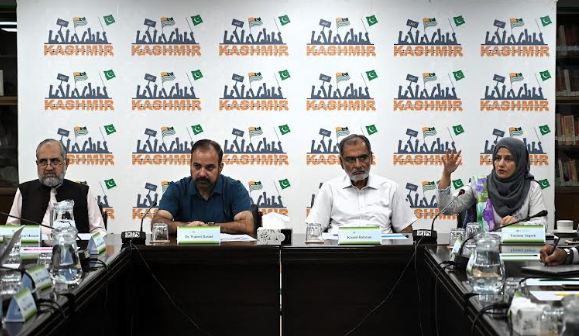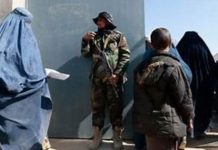ISLAMABAD, AUG 6 /DNA/ – While the restoration of occupied Jammu and Kashmir’s statehood remains uncertain, any such development would signal the erosion of India’s unilateral actions since August 5, 2019. With India’s internal unrest, mounting international scrutiny, and evolving global power dynamics, a new trajectory has emerged. India may attempt to reframe the narrative and capitalize on emerging scenarios. However, Pakistan must build on this trajectory, grounded in optimism, strategic clarity, and the unwavering pursuit of the Kashmiri people’s right to self-determination.
This was discussed during a session titled “Restoring Statehood of IOJ&K: A Step Forward or Political Mirage?” The meeting of the IPS’ Working Group on Kashmir (WGK) was addressed by Khalid Rahman, chairman IPS, Ambassador (r) Syed Abrar Hussain, vice-chairman IPS, Dr. Sheikh Waleed Rasool, director general Institute of Multi-Track Dialogue, Development and Diplomatic Studies, Farzana Yaqoob, secretary general WGK, Dr Khurshid Khan, IPS associate, Ambassador (r) Nasarullah Khan, Brig. (r) Raja Shozeb Majeed, international law expert, and Brig. (r) Said Nazir, IPS associate and security analyst.
The keynote speaker, Dr Waleed Rasool, noted that since 1947, the struggle of Indian Illegally Occupied Jammu and Kashmir (IIOJ&K) has been one of de facto versus de jure control. Once the territory came under Indian military control, it enabled India to engage in both legal and operational manipulation. The abrogation of Kashmir’s special status constituted a violation of multiple legal frameworks, including the Indian Independence Act, UNSC resolutions, bilateral agreements, and constitutional guarantees under Article 370. He emphasized the importance of Pakistan highlighting the Kashmir issue by engaging stakeholders at multiple levels. Equally important is the need to raise awareness about the legal status of Kashmir at international political, humanitarian, and legal forums.
Building on this legal and historical perspective, Brig (r) Khurshid Khan said India has been committing widespread human rights violations, but these atrocities have largely gone under-reported. However, the May conflict between Pakistan and India has once again brought the Kashmir issue to the international stage, giving rise to new geo-strategic realities. Global powers now increasingly recognize that the Indo-Pakistan conflict poses a serious threat to international peace. He noted that Pakistan must actively leverage its recently adopted UNSC resolution on the peaceful settlement of disputes to build diplomatic momentum.
Brig (r) Shozeb, while extending the strategic dimension, argued that Palestine serves as a test case, and India may attempt to replicate a similar model in Kashmir. However, he noted that India’s professed hegemony was severely shaken after the May standoff. This evolving scenario, he asserted, presents Pakistan with a strategic opportunity to shape the broader South Asian context in its favor. He recommended pursuing an advisory opinion from the ICJ on the Kashmir issue, leveraging the shift in international public opinion, engaging international think tanks, and establishing victim documentation centers to showcase testimonies via documentaries to expose Indian atrocities.
Adding a defense perspective, Brig (r) Said Nazir observed that Pakistan has effectively reestablished its deterrence in response to unwarranted Indian aggression. He cautioned that if India perceives this as the new normal, it would come at a significant cost for New Delhi.
In his assessment, Ambassador (r) Abrar Hussain stated that the actions taken on August 5, 2019, were both unconstitutional and illegal under domestic and international law. The BJP believed that by revoking Article 370, the people of Kashmir would submit to India’s will. However, the Pahalgam incident and subsequent developments have once again brought the Kashmir issue to the forefront, renewing calls for international attention and resolution.
Concluding the session, Khalid Rahman noted that a significant development since August 5, 2019, is that India has been exposed diplomatically and strategically, leading to a degree of isolation amid shifting regional and global geopolitical realities. Whether this results in the restoration of statehood to its pre-August 5 status or the division of IIOJ&K into two separate entities remains uncertain. Nonetheless, he emphasized that it is imperative for Pakistan to build on this evolving trajectory and intensify its advocacy for the Kashmiris’ right to self-determination.

















